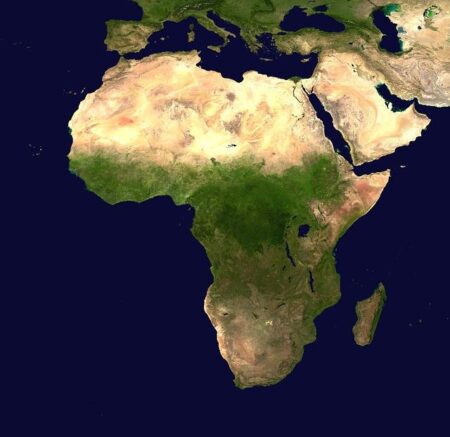As Africa experiences a swift digital evolution, an increasing number of advocates are emphasizing the necessity for the continent to establish its technological independence. This movement arises from a growing dependence on international technology and digital services, which raises critical issues regarding data privacy, security, and economic self-sufficiency. Following considerable investments in digital infrastructure and the rise of biometric technologies, experts are calling on African nations to adopt proactive strategies that protect their digital environments from external influences. This article examines the ramifications of this shift while highlighting both challenges and opportunities in Africa’s pursuit of a self-sufficient technological future.
The Urgent Need for Investment in Local Tech Infrastructure
The swift digitization across Africa has highlighted an immediate requirement for increased investment in local technology infrastructure. A strong tech ecosystem is vital not only for economic advancement but also for ensuring the digital sovereignty of African countries. Collaboration among stakeholders—including governments, private enterprises, and international organizations—is essential to prioritize funding in critical areas such as broadband expansion, data centers, and cybersecurity measures.
Key Investment Areas Include:
- Broadband Expansion: Enhancing high-speed internet access across urban and rural regions.
- Data Storage Facilities: Creating secure local data centers to manage details effectively.
- Skill Advancement: Investing in education initiatives aimed at cultivating local tech talent.
- Cybersecurity Measures: Fortifying defenses against escalating cyber threats.
Moreover, a unified investment strategy can foster innovation and entrepreneurship within local tech startups. Recent research indicates that nations with strong digital infrastructures experience GDP growth that allows reinvestment into other sectors like agriculture and healthcare. A thorough plan detailing fund allocation is crucial to ensure clarity and effective use of resources.
| Investment Focus | Anticipated Benefits |
|————————-|———————————————————-|
| Broadband Expansion | Improved connectivity leading to enhanced economic prospects |
| Data Storage Facilities | Greater data sovereignty with reduced foreign dependency |
| Skill Development | Creation of a skilled workforce prepared for tech careers |
| Cybersecurity Measures | Enhanced protection against breaches and cyber risks |
Cultivating Local Talent: Strategies for Innovation
The imperative for Africa to develop its homegrown talent while fostering innovation within its digital sector has never been more pressing. To create a enduring tech ecosystem, stakeholders must adopt a multifaceted approach that encompasses:
- Educational Initiatives: Establishing comprehensive programs focused on essential skills such as coding, cybersecurity practices, and data analysis.
- Startup Support Systems: Launching incubators or accelerators that provide mentorship alongside financial backing to help transform innovative concepts into successful businesses.
- Collaborative Efforts Between Sectors: Promoting partnerships between governmental bodies and private firms aimed at creating supportive policies along with funding avenues tailored toward local technology projects.
Additionally, nurturing an innovative culture necessitates reliable access to technology coupled with dependable internet services through:
- Infrastructure Investments: Upgrading telecommunications networks so all regions can participate fully in the digital economy.
- Community Involvement: Engaging locals in technological initiatives helps identify specific challenges while promoting grassroots innovations.
- Intellectual Property Safeguards: Strengthening IP laws will protect inventions while encouraging more creators to bring their ideas into fruition.
Regulatory Reforms: Safeguarding Data While Promoting Growth
Africa’s ongoing transition towards digitization offers important potential for economic development; however without effective regulatory reforms there may be increased risks related to data privacy concerns. It is crucial that African nations prioritize establishing comprehensive laws designed not only to protect personal information but also promote trustworthiness within online interactions.
Essential reforms should aim at creating standardized regulations aligned with global best practices yet tailored specifically towards addressing unique challenges faced by African countries—such as limited infrastructure capabilities or varying levels of technological literacy among populations.
Furthermore,a solid regulatory framework will be instrumental in attracting investments necessary for sustainable growth within the tech industry. By implementing policies favoring data localization alongside public-private collaborations—and ensuring compliance with international standards—African states can effectively nurture domestic startups capable of innovating solutions suited precisely towards continental needs. Strategies could involve forming dedicated authorities responsible solely for overseeing data protection efforts along with incentives directed at businesses prioritizing security measures.Investing resources into capacity building programs combined with public awareness campaigns will further empower citizens regarding ownership over their own personal information enabling them thrive amidst today’s evolving economy driven by technology advancements.
Conclusion: Embracing Technological Sovereignty
To sum up,the urgency surrounding Africa’s quest toward achieving technological sovereignty amid rapid digitization cannot be overstated.With increasing reliance upon various sectors—from finance through healthcare—the continent faces both remarkable opportunities alongside formidable challenges.As leaders navigate issues concerning privacy,data security,and dependency upon foreign providers,it becomes paramount they emphasize fostering localized innovation paired together infrastructural development.Promoting indigenous solutions not only enhances resilience economically but empowers nations navigating complexities inherent within our swiftly changing global landscape.As diverse stakeholders unite behind building robust ecosystems supporting these endeavors,Africa stands poised possibly emerging as influential player globally.The journey ahead may present hurdles;however it promises unprecedented growth possibilities empowering individuals throughout this vibrant continent moving forward confidently embracing future possibilities ahead!







